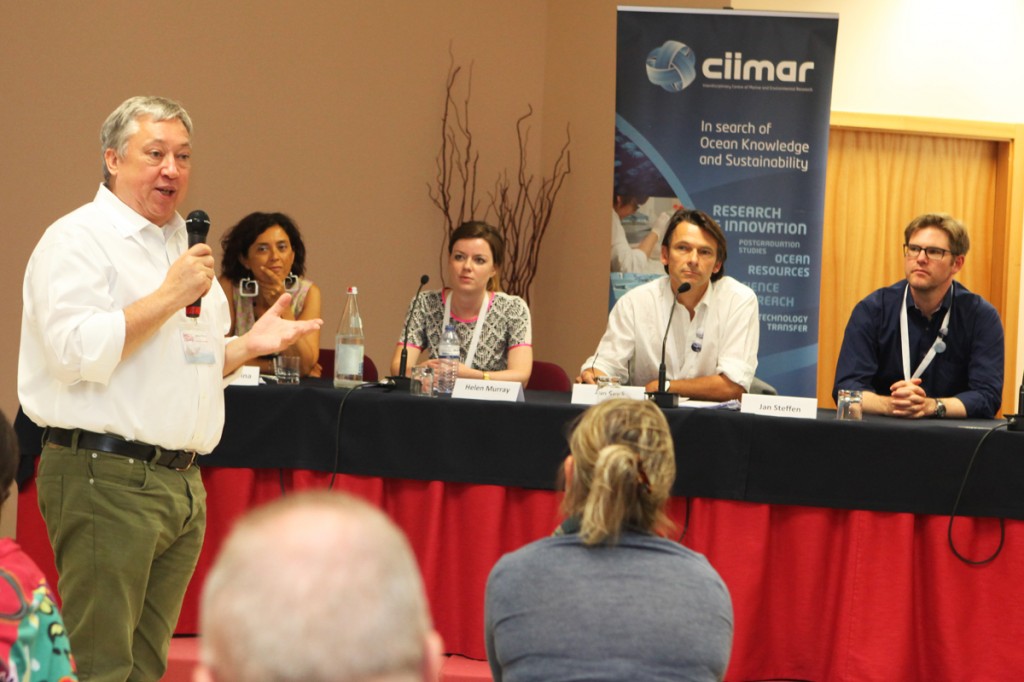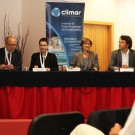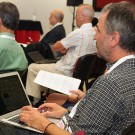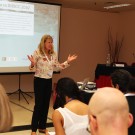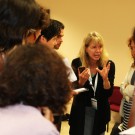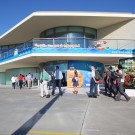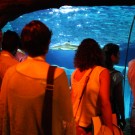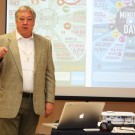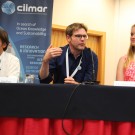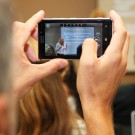It’s raining. Of course, it is raining. We are back in Hamburg. And the last episode of our trip to Kiel with the airport bus may take as long as the flight from Porto to Brussels, because a traffic jam on the A7 motorway is announced. Good opportunity to start writing about the last three days in Porto.
As we wrote in our first post “Cumprimentos do Porto” (Greetings from Porto), we attended the 1st International Marine Science Communication Conference (IMSCC). The idea for this conference was born in a meeting of the European Marine Board Communication Panel. The challenge of organizing a completely new conference from scratch was taken on by the Interdisciplinary Centre of Marine and Environmental Research (CIIMAR) at the University of Porto. To make a long story short: The team did a great job. They were able to come up with keynote speakers like Nancy Baron, Director of Science Outreach at the Science Communication Organization COMPASS and author of the book “Escape from the Ivory Tower”, as well as David Braun, Digital Outreach Director at National Geographic Magazine, or the US environmental journalist and Pulitzer Prize winner Kenneth Weiss. Besides, they motivated science communicators, scientists and journalists from all over Europe, the USA, Canada and even Japan to come to Porto for the IMSCC. Therefore the major goal of every conference was achieved: IMSCC2014 was a great place for getting in contact with colleagues, peers and interesting people. We finally got to know the faces behind the twitter accounts of Ifremer, JPI Oceans or Plymouth Marine Lab. Dear colleagues, if you read this: It was nice to meet you!
- Part of the IMSCC2014 organization committee: SCIIMAR director Vitor Vasconcelos, Ana Noronha (Ciência Viva), Agnès Marhadour (CIIMAR) and Jan Seys (VLIZ, EMBCP). Photo: Christian Urban
- Twittering from IMSCC2014. Photo: Christian Urban
- Nancy Baron: A good communicator is taking up leadership. Photo: Christian Urban
- Nancy Baron explaining power tools for science communicators. Photo: Christian Urban
- On our way to Sea Life. Photo: Christian Urban
- In the Sea Life Centre of Porto. Photo: Christian Urban
- David Braun demonstrating the online activities of National Geographic. Photo: Christian Urban
- Jan answering questions after the Oceanblogs presentation. Left: session chair Jan Seys (EMBCP), right nature photographer Christine Shephard. Photo: Christian Urban
- Lesson learned: tweet it! Photo: Christian Urban
Of course the conference raised questions, too. One of the more simple ones was: Do we need another science communication conference? Jan Seys, Communication Manager at the Flanders Marine Institute (VLIZ) and current chair of the EMBCP, advocates this “Yes. Because marine sciences are different. We make the invisible visible”. There is nothing to add.
But did the conference succeed in highlighting the characteristics of marine sciences? I think not completely. We heard lots of talks and presentations about projects in marine science communication, but the central statements were all about science communication in general. Nancy Baron taught us how to deliver clear and strong messages to the public, David Braun presented the online activities of National Geographic which made us all dream of a photo stock of about 1 million images made by professional photographers. It is good to be reminded that your communication should be positive and that images are important to tell a story, but this is not completely new knowledge and especially for marine sciences.
For us as blog managers (among other things) for Kiel Marine Sciences, the talk of Stephen Curry was one of the highlights of IMSCC. The Professor of structural biology at Imperial College (London) started to write blogs in 2008, still with a very critical attitude towards social media. Out of a scientist’s point of view he told in an entertaining way how he became more and more confident with his writings. In the end he even used his blogs to fight for better science funding in the UK. His message: You don’t have to be a nerd or an internet addict to write online about your work. The opposite is true. With blogging about your work you even get in contact with peers and colleagues in real life from all over the world. A message we’ll try to pass on to Kiel Marine Scientists…
What about Oceanblogs? We tried to present blog about marine sciences on Tuesday morning in a rather daring way: partially online. Of course, we should have known… the wireless network failed exactly in the wrong moment. 🙂 Fortunately, we also had our traditional power-point presentation. After all, the problem with the internet was not only a bad thing – everybody could remember the “presentation without internet”. So Oceanblogs should be famous all over Europe now. In the following coffee breaks we had some interesting conversations with project managers and colleagues about our concepts or even possible collaborations. Thank you for these positive reactions and we hope to stay in touch.
In the final session on Tuesday afternoon a discussion started on whether or not there should be a second (and 3rd, 4th ) edition of IMSCC. An overwhelming majority was in favor of further conferences of this type. We share this opinion. Maybe a future program should be more focused on marine sciences and the IMSCC should distinguish itself clearly from similar events like the EMSEA Conference. But there is a need for science communicators to exchange experiences and to learn from each other on an international level. Finally there is a demand for another IMSCC, as you can clearly see on twitter now.
Thank you to the CIIMAR team for starting this tradition.
Christian Urban & Jan Steffen
(In the end the bus to Kiel was faster than expected, so we finished the text on Thursday…)
